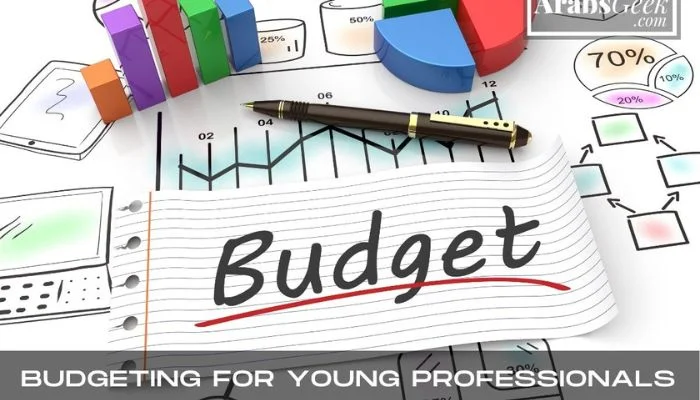Introduction | Budgeting For Young Professionals
As a young professional, budgeting is a crucial skill that can help you build a strong financial foundation. In this article, we’ll discuss the importance of budgeting, how to create a successful budget, budgeting tools and strategies, and tips for sticking to your budget. Let’s get started!
Table of Contents
The Importance of Budgeting
Budgeting is a critical financial skill for young professionals. It helps you track your income and expenses, ensuring that you’re living within your means and making progress toward your financial goals.
For any business enquiry, you can contact us at ArabsGeek.com
For more of such financial articles, Consider visiting our sister website at EntrepreneursPilot.com
Benefits of Budgeting
There are several benefits to budgeting, including:
Financial Goals
Budgeting helps you set and achieve financial goals, such as paying off debt, saving for a home, or building an emergency fund.
Debt Management | Budgeting For Young Professionals
A well-crafted budget can help you manage debt by allocating funds for debt repayment and avoiding new debt.
Saving for the Future
Budgeting allows you to prioritize saving for retirement, investments, and other long-term financial goals.
Overcoming Budgeting Challenges
Young professionals may face challenges when budgeting, such as fluctuating income or unexpected expenses. Overcoming these challenges is possible with a flexible and realistic budget.
Creating a Successful Budget
A successful budget helps you manage your finances and achieve your financial goals. Follow these steps to create your budget:
Identifying Income Sources | Budgeting For Young Professionals
List all your income sources, including your salary, bonuses, and any side income. Be sure to calculate your net income, which is the amount you take home after taxes and deductions.
Categorizing Expenses
Divide your expenses into categories, such as:
Fixed Expenses
These are expenses that remain the same each month, such as rent, mortgage payments, and insurance premiums.
Variable Expenses
These expenses can fluctuate month-to-month, such as groceries, utilities, and transportation costs.
Discretionary Expenses | Budgeting For Young Professionals
These are non-essential expenses, such as dining out, entertainment, and hobbies.
Allocating Funds for Savings and Debt Repayment
Determine how much money you can allocate toward savings and debt repayment each month. Prioritize building an emergency fund, paying off high-interest debt, and saving for retirement.
Adjusting Your Budget
Regularly review and adjust your budget as needed. This may include updating your income or expense categories or reallocating funds to different savings goals.
Budgeting Tools and Strategies
There are various budgeting tools and strategies available to help you manage your finances. Some popular options include:
Budgeting Apps
Budgeting apps, such as Mint, YNAB, and EveryDollar, can help you track your income and expenses, set financial goals, and monitor your progress.
Spreadsheets and Templates
Using a spreadsheet or budgeting template can help you create a personalized budget that suits your needs. You can find free budgeting templates online or create your own in programs like Excel or Google Sheets.
Cash Envelope System | Budgeting For Young Professionals
The cash envelope system involves dividing your cash into envelopes for each expense category. When the money in an envelope runs out, you can’t spend any more in that category until the next month.
Zero-Based Budgeting
With zero-based budgeting, you allocate every dollar of your income to a specific expense or savings category. This method can help you make the most of your money and avoid overspending.
Tips for Sticking to Your Budget
Creating a budget is just the first step – sticking to it is the real challenge. Here are some tips to help you stay on track:
Review Your Budget Regularly
Check in with your budget regularly to monitor your spending and ensure you’re staying within your limits. Make adjustments as needed to keep your finances on track.
Find Ways to Cut Expenses | Budgeting For Young Professionals
Look for areas where you can cut back on spending, such as canceling subscriptions, cooking at home more often, or shopping for sales and discounts.
Prioritize Needs Over Wants
When faced with a spending decision, ask yourself if it’s a need or a want. Prioritize your essential expenses and save discretionary spending for when you have extra funds available.
Stay Accountable | Budgeting For Young Professionals
Share your budgeting goals with a friend, family member, or financial advisor who can help you stay accountable and offer support when needed.
Conclusion | Budgeting For Young Professionals
Budgeting is a critical skill for young professionals looking to build a strong financial foundation. By understanding the importance of budgeting, creating a successful budget, utilizing budgeting tools and strategies, and sticking to your budget, you can achieve your financial goals and enjoy greater financial stability.
Frequently Asked Questions (FAQs)
Q1: How often should I review my budget?
Review your budget at least once a month, but consider checking in more frequently if you’re new to budgeting or have recently made significant changes to your financial situation.
Q2: What’s the best budgeting app for young professionals?
There’s no one-size-fits-all answer, as the best budgeting app depends on your personal preferences and financial goals. Popular options include Mint, YNAB, and EveryDollar.
Q3: How can I make my budget more flexible?
To make your budget more flexible, include a miscellaneous or “buffer” category for unexpected expenses or income fluctuations. Regularly review and adjust your budget as needed.
Q4: What should I do if I consistently overspend in certain categories?
If you consistently overspend in certain categories, consider finding ways to cut back on those expenses or reallocating funds from other areas of your budget to cover the additional spending.
Q5: How can I stay motivated to stick to my budget?
Stay motivated by setting clear financial goals, celebrating your progress, and reminding yourself of the long-term benefits of budgeting, such as financial security and achieving your dreams.











